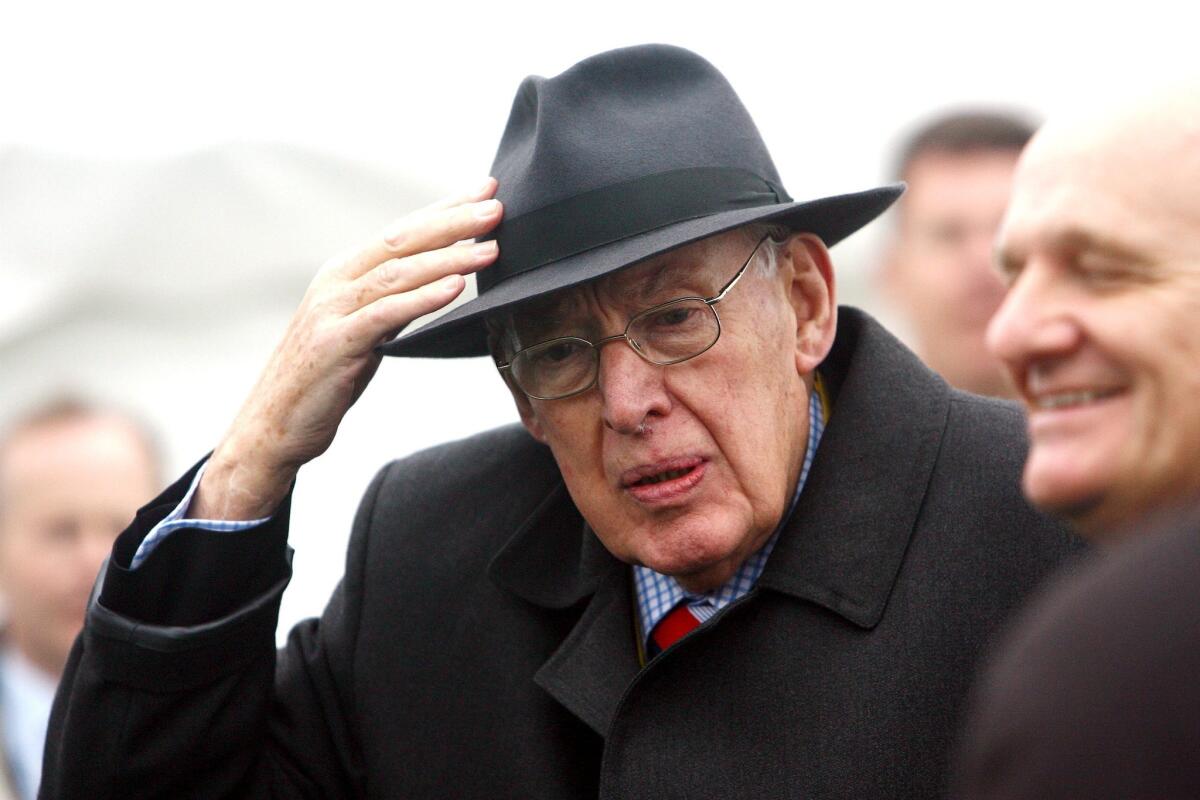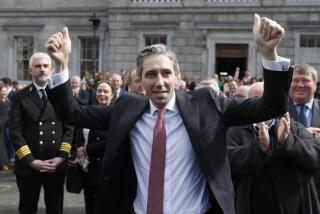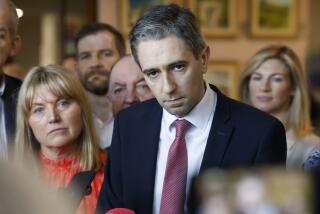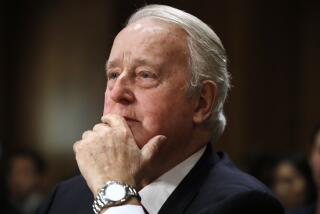Ian Paisley dies at 88; Northern Ireland firebrand turned peacemaker

Ian Paisley, the thundering Protestant preacher who helped fan the sectarianism of Northern Ireland’s “Troubles” but went on to lead a power-sharing government that included some of his most bitter Catholic enemies, died Friday in Belfast. He was 88.
His wife, Eileen Paisley, announced his death in a statement. He had been in declining health.
Paisley was one of Northern Ireland’s most prominent figures of the last 50 years and one of its most polarizing, a big-jawed, stentorian-voiced leader who vowed “no surrender” in the fight to maintain British rule in the province.
He denounced peace-minded reformers as traitors, railed against the pope as the Antichrist and made himself a thorn in the side of British prime ministers from both major political parties during a conflict that claimed the lives of more than 3,500 people.
But in a remarkable turnaround, Paisley eventually came to accept the so-called Good Friday agreement in 1998 that ended armed conflict between Protestant loyalists and Catholic republicans. Nine years later, in a scene many thought they’d never witness, the octogenarian Paisley was sworn in as first minister of Northern Ireland’s power-sharing assembly, with a longtime leader of Sinn Fein, the political wing of the Irish Republican Army, at his side as his deputy.
Once sworn enemies, Paisley and Deputy First Minister Martin McGuinness developed such a startling rapport that commentators soon dubbed them the Chuckle Brothers.
“We had the ability to sit down and talk to one another about the way forward, and we were agreed on how we should move forward,” McGuinness later recalled.
The two men worked well together until Paisley stepped down less than a year into the job, in 2008, partly because of his party’s concern over his growing closeness to McGuinness. That same year Paisley gave up his post as moderator of the breakaway Free Presbyterian Church that he had founded more than 60 years ago, and in 2010 he declined to run again for the seat in the British Parliament that he occupied for four decades. (His son won it instead.)
But Paisley remained a charismatic figure to his supporters and a commanding speaker. In early 2012, he delivered a farewell sermon at his Martyrs Memorial Church in Belfast, the Northern Irish capital.
“I am exceedingly happy that I’ve had the privilege of being the preacher here for 65 years, and that’s a long time,” he told his admiring congregants. “We have seen a miraculous work done, and we have seen a great change in our city in many ways.”
He was born Ian Richard Kyle Paisley on April 6, 1926, in Armagh, the son of an independent Baptist pastor and a religious Scottish mother. He grew up in County Antrim, part of which he would later represent as a member of Parliament, and as a young man felt a calling to follow his father’s footsteps into Christian ministry.
Paisley’s theological training reinforced a fierce and inflammatory Protestantism that gave no quarter to the Roman Catholic Church, which he professed all his life to hate. He had no qualms about describing it as “the mother of all harlots” while insisting he had nothing against individual Catholics.
In 1963, his booming voice, imposing presence and religious invective catapulted him into the public eye when he led protests against a decision to lower the British flag on government buildings in Belfast upon the death of Pope John XXIII.
Paisley’s hard-line religious views were part and parcel of his strident unionism. A year later, his insistence that the Irish flag be removed from display in a Sinn Fein office in Belfast led to riots. And in 1969, Paisley was thrown in jail for heading an illegal counter-demonstration against Catholic civil-rights protesters demanding nondiscrimination in housing and employment.
He entered the British Parliament in 1970 and the European Parliament in 1979, where he created a stir several years later by interrupting a speech by Pope John Paul II, denouncing him loudly as the antichrist and getting himself ejected from the chamber.
Paisley initially viewed the 1998 power-sharing accord as a profound betrayal.
“The British government, in cahoots with Dublin, Washington, the Vatican and the IRA, are intent to destroy the province,” he wrote earlier that year. “The scene is set and the program in position to demolish the province as the last bastion of Protestantism in Europe.”
Yet by the middle of the next decade, Paisley, by then in his late 70s, had begun to mellow. The transformation was partly spurred, perhaps, by a spell of bad health in 2004, when he underwent tests for an undisclosed illness and later acknowledged that he had “walked in death’s shadow.” He appeared gaunt and frail in public.
His health improved, however. He once told an interviewer that his secret was “a glass of cider vinegar with some honey in it every morning. You should try it.”
In 2007, with his Democratic Unionist Party as the largest loyalist grouping in Northern Ireland’s regional assembly, Paisley became the province’s most powerful leader, its first minister. He was 81.
At his swearing-in, he invoked the Bible, saying that there was “a time for love and a time for hate, a time for war and a time for peace.”
“From the depth of my heart, I can say Northern Ireland has come to a time of peace. How good it will be to be part of a wonderful healing in this province,” he declared. “Today, we are starting the road which I believe will take us to everlasting peace in our province.”
It was a speech his younger self may have had trouble imagining. Only a few years before, Paisley had declared in an interview: “All I can say is that I’ll not be changing. I will go to the grave with the convictions I have.”
In 2010, he was given a peerage and elevated to the House of Lords as Baron Bannside.
Besides his wife, Paisley is survived by three daughters, two sons and grandchildren.
More to Read
Start your day right
Sign up for Essential California for news, features and recommendations from the L.A. Times and beyond in your inbox six days a week.
You may occasionally receive promotional content from the Los Angeles Times.







